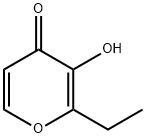A8363912
Vanillin melting point standard , +81to+83℃ , 121-33-5
Synonym(s):
4-Hydroxy-3-methoxybenzaldehyde;Vanillic aldehyde;Vanillin;Vanillinum
CAS NO.:121-33-5
Empirical Formula: C8H8O3
Molecular Weight: 152.15
MDL number: MFCD00006942
EINECS: 204-465-2
| Pack Size | Price | Stock | Quantity |
| 1G | RMB159.20 | In Stock |
|
| others | Enquire |
Update time: 2022-07-08
PRODUCT Properties
| Melting point: | 81-83 °C(lit.) |
| Boiling point: | 170 °C15 mm Hg(lit.) |
| bulk density | 600kg/m3 |
| Density | 1.06 |
| vapor density | 5.3 (vs air) |
| vapor pressure | >0.01 mm Hg ( 25 °C) |
| FEMA | 3107 | VANILLIN |
| refractive index | 1.4850 (estimate) |
| Flash point: | 147 °C |
| storage temp. | 2-8°C |
| solubility | methanol: 0.1 g/mL, clear |
| pka | pKa 7.396±0.004(H2O
I = 0.00
t = 25.0±1.0) (Reliable) |
| form | Crystalline Powder |
| color | White to pale yellow |
| PH | 4.3 (10g/l, H2O, 20℃) |
| Odor | at 100.00 %. vanilla |
| Odor Type | vanilla |
| biological source | synthetic |
| Water Solubility | 10 g/L (25 ºC) |
| Sensitive | Air & Light Sensitive |
| Merck | 14,9932 |
| JECFA Number | 889 |
| BRN | 472792 |
| Stability: | Stable. May discolour on exposure to light. Moisture-sensitive. Incompatible with strong oxidizing agents, perchloric acid. |
| LogP | 1.17 at 25℃ |
| CAS DataBase Reference | 121-33-5(CAS DataBase Reference) |
| NIST Chemistry Reference | Benzaldehyde, 4-hydroxy-3-methoxy-(121-33-5) |
| EPA Substance Registry System | Vanillin (121-33-5) |
Description and Uses
Vanillin is found in many plants, such as the tuber of Rhizoma Gastrodiae (Tian Ma), the whole herb of Equisetum (Mu Zei), Ulva pertusa (Kong Shi Chun), and sugar beets, vanilla beans, Peru balsam, and so on .
Labelled Vanillin. Occurs naturally in a wide variety of foods and plants such as orchids; major commercial source of natural vanillin is from vanilla bean extract. Synthetically produced in-bulk fro m lignin-based byproduct of paper processes or from guaicol.
Safety
| Symbol(GHS) |  GHS07 |
| Signal word | Warning |
| Hazard statements | H319 |
| Precautionary statements | P264-P280-P305+P351+P338-P337+P313 |
| Hazard Codes | Xi |
| Risk Statements | 22-36/37/38-36 |
| Safety Statements | 26 |
| WGK Germany | 1 |
| RTECS | YW5775000 |
| Autoignition Temperature | >400 °C |
| TSCA | Yes |
| HS Code | 29124100 |
| Hazardous Substances Data | 121-33-5(Hazardous Substances Data) |
| Toxicity | LD50 orally in rats, guinea pigs: 1580, 1400 mg/kg (Jenner) |




